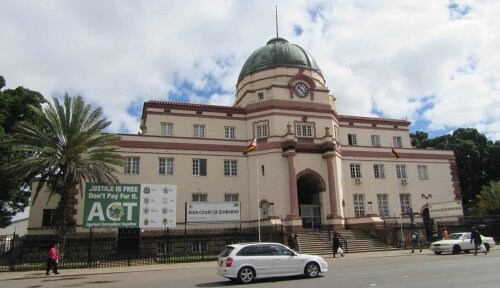Best Civil Rights Lawyers in Bulawayo
Share your needs with us, get contacted by law firms.
Free. Takes 2 min.
List of the best lawyers in Bulawayo, Zimbabwe
About Civil Rights Law in Bulawayo, Zimbabwe
Civil rights law in Bulawayo, Zimbabwe, is based on the fundamental principles enshrined in the Constitution of Zimbabwe and various national statutes. Civil rights ensure that all individuals are protected from discrimination, enjoy equal treatment, and have access to due process under the law. These rights cover areas such as freedom of speech, protection from unlawful detention, equal access to public services, fair employment practices, and freedom from discrimination based on race, gender, religion, or disability. Civil rights law in Bulawayo is implemented and enforced by courts, as well as governmental agencies tasked with upholding these vital legal protections.
Why You May Need a Lawyer
Many situations may require you to consult with a civil rights lawyer in Bulawayo. Individuals or groups sometimes face discrimination in the workplace, schools, or when accessing public services. Other instances include cases of police misconduct, unlawful detention, restriction of free speech, or violation of property rights. Sometimes, civil rights disputes arise during interactions with government departments or when contesting unjust laws or regulations. If you believe your rights have been violated, or you need help understanding your rights under the law, a lawyer can provide guidance, representation, and support to ensure that justice is achieved.
Local Laws Overview
Zimbabwe's local laws are rooted in the Constitution, which provides a broad Bill of Rights applicable nationwide, including Bulawayo. Key aspects include the right to equality before the law, protection from discrimination, freedom of assembly and association, freedom of expression, right to privacy, and the right to a fair trial. The Labour Act, Education Act, and other sectoral laws also include specific protections against discrimination and ensure fair treatment. Local government by-laws in Bulawayo must comply with national laws and the Constitution, so any infringement on civil rights can often be challenged through the courts or with the assistance of relevant oversight bodies.
Frequently Asked Questions
What are civil rights?
Civil rights are the basic legal protections that guarantee equal treatment and freedom from discrimination for all individuals, regardless of their background or group identity.
What protections do I have under Zimbabwean law?
The Zimbabwean Constitution, particularly the Bill of Rights, guarantees freedoms such as equality before the law, non-discrimination, access to justice, property rights, and freedoms of expression, assembly, and association.
What can I do if my civil rights are violated in Bulawayo?
You can report the violation to relevant authorities, seek assistance from a lawyer, or approach human rights organizations for support. If needed, you may initiate legal proceedings in the courts.
Is discrimination illegal in Bulawayo?
Yes, discrimination based on race, gender, ethnicity, religion, disability, and similar grounds is prohibited by the Constitution and various statutes in Zimbabwe.
Can I challenge a government decision that affects my civil rights?
Yes, you can challenge government actions or decisions through the courts if you believe they violate your constitutional rights.
What should I do if I experience police misconduct?
You can file a complaint with the police's internal investigations unit, report the matter to oversight bodies such as the Zimbabwe Human Rights Commission, or consult a lawyer for advice on taking legal action.
Are my rights protected during arrest and detention?
Yes, the law requires that you be informed of the reasons for your arrest, have access to legal counsel, and be brought before a court within a reasonable time.
Can my employer discriminate against me?
No, employment laws in Zimbabwe prohibit discrimination based on certain protected characteristics. Any unfair treatment at work can be contested.
Where can I get free or low-cost legal assistance for civil rights issues?
Organizations such as the Legal Resources Foundation, Zimbabwe Lawyers for Human Rights, and the Zimbabwe Human Rights Commission provide assistance to those in need of legal support.
Are civil rights the same as human rights?
Civil rights are a subset of human rights. Civil rights focus mainly on equality, freedom from discrimination, and fair treatment within the legal system, while human rights are broader and include economic, social, and cultural rights.
Additional Resources
Several organizations and governmental bodies in Bulawayo and Zimbabwe can provide information or assistance regarding civil rights:
- Zimbabwe Human Rights Commission
- Legal Resources Foundation
- Zimbabwe Lawyers for Human Rights
- The Zimbabwe Gender Commission
- Office of the Public Protector
- Local Magistrates’ Courts
- Bulawayo City Council Legal Department
These organizations offer advice, advocacy, legal representation, and, in some cases, mediation or other forms of dispute resolution.
Next Steps
If you believe your civil rights have been violated or you need legal assistance in Bulawayo, start by gathering any documentation or evidence related to your case. Reach out to a qualified civil rights lawyer or contact one of the recommended organizations for initial advice. Many organizations offer free consultations or legal aid for qualifying individuals. Make sure to act promptly, as some civil rights cases are subject to time limits for reporting or legal submission. If your situation is urgent, such as in cases of unlawful detention or imminent harm, prioritize contacting a legal professional immediately. Taking timely and informed action is the best way to protect your rights and seek justice.
Lawzana helps you find the best lawyers and law firms in Bulawayo through a curated and pre-screened list of qualified legal professionals. Our platform offers rankings and detailed profiles of attorneys and law firms, allowing you to compare based on practice areas, including Civil Rights, experience, and client feedback.
Each profile includes a description of the firm's areas of practice, client reviews, team members and partners, year of establishment, spoken languages, office locations, contact information, social media presence, and any published articles or resources. Most firms on our platform speak English and are experienced in both local and international legal matters.
Get a quote from top-rated law firms in Bulawayo, Zimbabwe — quickly, securely, and without unnecessary hassle.
Disclaimer:
The information provided on this page is for general informational purposes only and does not constitute legal advice. While we strive to ensure the accuracy and relevance of the content, legal information may change over time, and interpretations of the law can vary. You should always consult with a qualified legal professional for advice specific to your situation.
We disclaim all liability for actions taken or not taken based on the content of this page. If you believe any information is incorrect or outdated, please contact us, and we will review and update it where appropriate.










